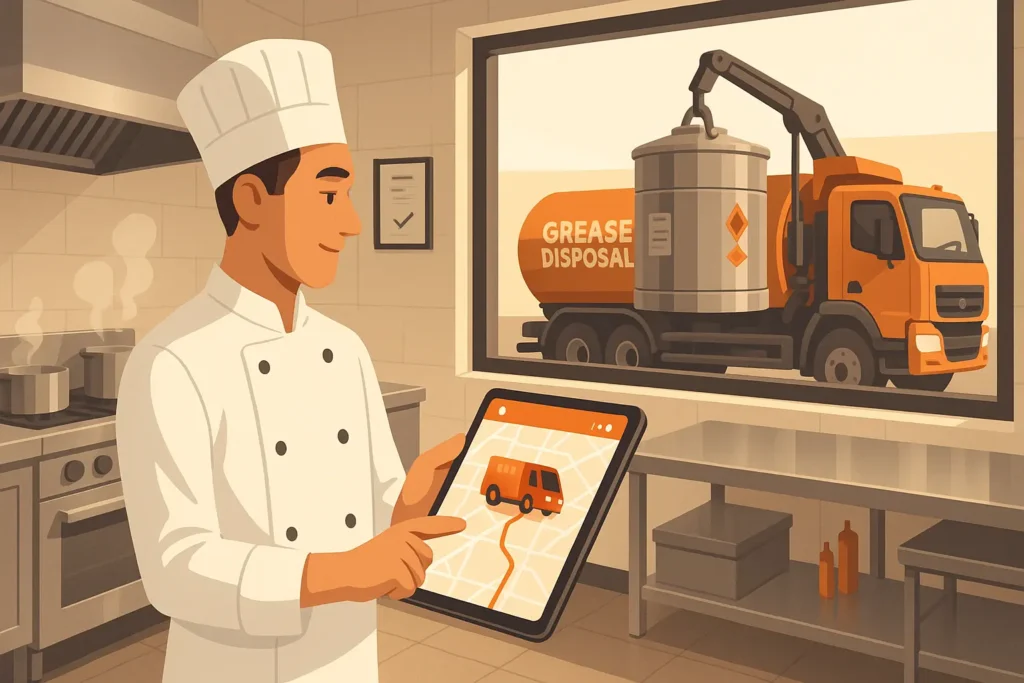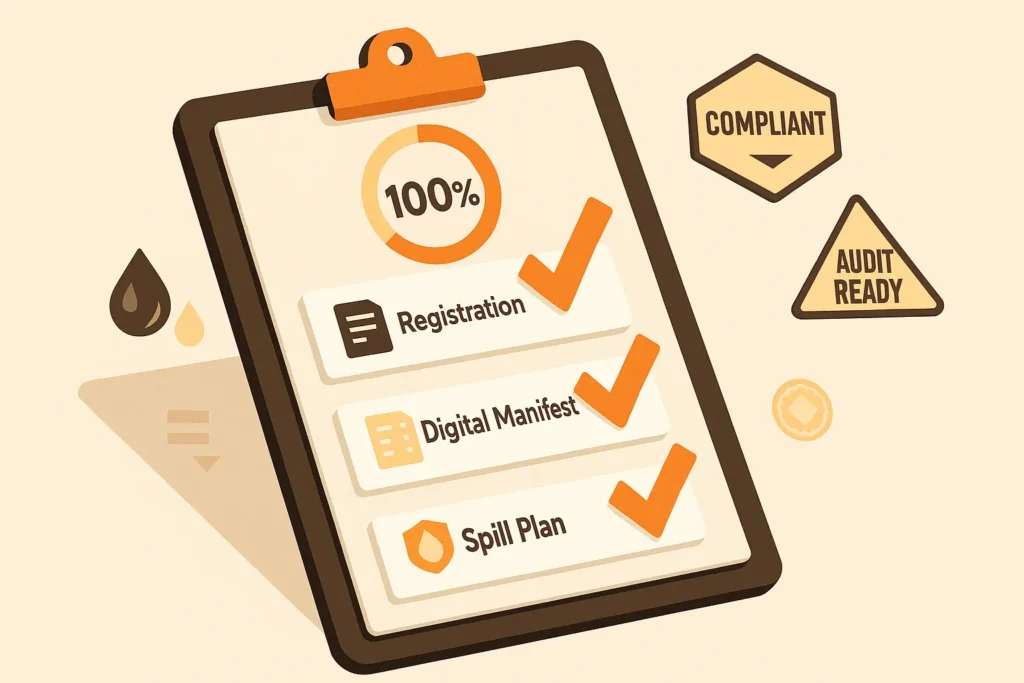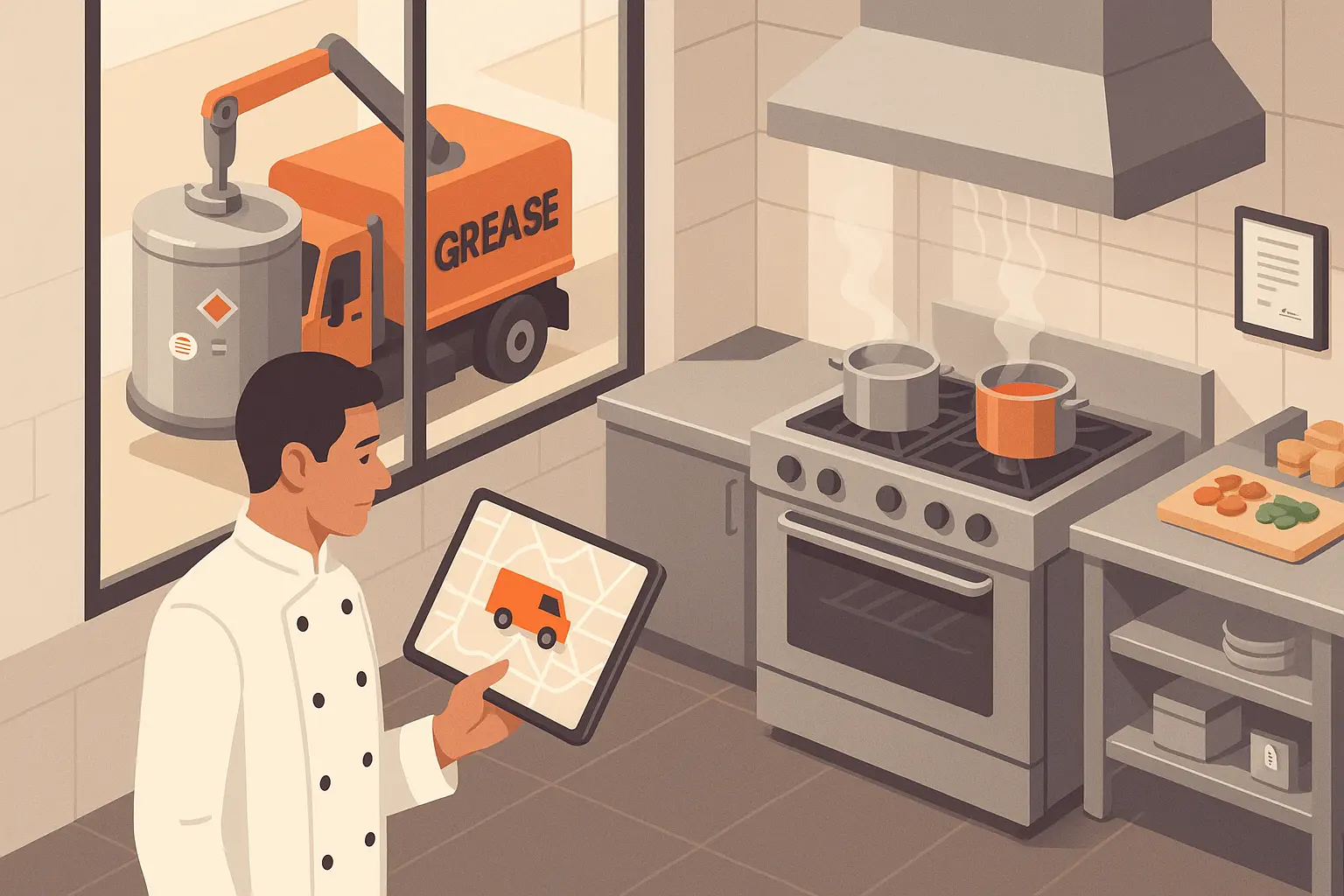Table of Contents
Why Real Time Collection Status Matters
A fryer dumps roughly a pound of new grease into the sewer for every five minutes a pickup runs late, city engineers warn. Florida inspectors can now cross check your manifests against the truck’s disposal receipts in seconds, and New Jersey health officers increasingly ask chefs to “show the app” during pop inspections. Add rising fines: $50k per clog in metro Atlanta, and the business case writes itself: live status isn’t tech fluff; it is insurance for your license. Restaurants that switched to GPS stamped pickups cut missed visits by nearly half and saved an average of three staff hours a month otherwise spent chasing paperwork.

How a Mobile Tracking App Keeps You Compliant & Calm
The moment a driver scans your tank, the app time stamps volume, temperature, and tank ID, then pushes a manifest PDF straight to your compliance inbox with no clipboards, no wet signatures. Georgia’s new digital portal imports that file automatically, satisfying Rule 391 3 6 .24 without extra uploads. In New Jersey, the same data feed attaches the PVSC FOG approval number so regulators see the disposal path end to end. EPA research on smart data infrastructure shows that tying sensors to real time dashboards can cut overflow risk by 30 percent. That means fewer back ups, fewer emergency pump fees, and zero late night “Where’s the truck?” calls.

Coverage You Can Count On From Pensacola to Paramus
Grease Connections runs licensed fleets across every major metro in Florida, Georgia, and New Jersey, mapped to fryer volume and local curb restrictions. Tampa, Orlando, and Miami Beach see daily routes; Atlanta’s core drops to 14 day minimums under county code; New Jersey’s shore towns tighten windows in summer to keep boardwalks clear. Because the same mobile platform powers each market, multi state groups view all pickups on one screen instead of juggling three vendors. Restaurants report a 12 percent rebate uptick after consolidating, thanks to uniform volume bonuses. Translation: fewer vendors, more dollars back, one audit trail.
From Pickup Alert to Accounting Report: Your Data, Actionable
Every scan flows into a dashboard that converts gallons to carbon emission offsets, a metric lenders now weigh in ESG scoring. Filters let a GM export last quarter’s pickups or drill into a single missed tag. Florida’s Senate Bill 1110 demands three year manifest retention; the platform keeps them forever in the cloud. Need proof for a surprise fire inspection? Swipe, show the stamped manifest, and move on. CFOs love that the CSV feed drops straight into accounting suites, closing the loop between fryer, dock, and ledger in one click.
State by State Rules at a Glance
| State | Key Rule | Manifest Retention | Digital Acceptance | Fine Ceiling |
|---|---|---|---|---|
| Florida | F.S. 403.0741: service manifest required | 3 yrs | Yes | $10k per day |
| Georgia | Rule 391 3 6 .24: statewide transporter permit | 2 yrs | Yes (portal) | $50k per clog |
| New Jersey | PVSC FOG approval & N.J.A.C. 7:9A 8.1 | 5 yrs | Yes | $25k per day |
Integrating Alerts Into Kitchen Workflow
Line cooks already watch ticket screens; adding a “Grease ETA 12 mins” banner keeps them from dumping oil right before the truck arrives. Case studies from West Coast kitchens that adopted app based prompts cut last minute spills by a quarter. Linking the alert channel to Slack or Microsoft Teams means the GM, maintenance tech, and finance team all see the same pickup confirmation in real time. EPA grease removal research notes that early warnings slash clean out cost curves, turning preventive maintenance into a scheduling, not emergency, expense.
Transition Guide: Switching Without a Hitch
Worried about mid contract gaps? Our transition team schedules the first pickup within 48 hours and back dates digital manifests so you never appear “off grid.” New Jersey food trucks get seasonal tanks swapped during permit renewals, avoiding shore town access bans. Georgia restaurants moving from quarterly to bi weekly service see less sludge, so grease traps hit the 25 percent rule slower and require fewer expensive pump outs. A dedicated compliance liaison emails inspectors the new transporter certificate, satisfying local codes before the truck rolls. Your kitchen keeps frying; the paperwork happens in the background.
Ready in 90 Seconds: Your Next Step
Enter your ZIP, fryer volume, and preferred pickup window in the form below, and the system returns a custom schedule and rebate estimate before the fryer reheats. If you operate in Miami, Atlanta, or Newark, the page also links to our service hub for localized compliance tips. One form, one live map, lifelong peace of mind.









